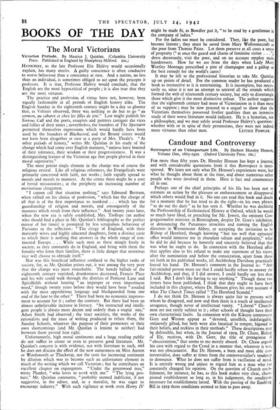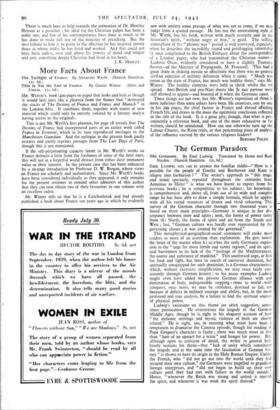Candour and Controversy
Retrospect of an Unimportant Life. By Herbert Hensley Henson, Volume One, 1863-192o. (Oxford University Press. 16s.) FOR more than fifty years Dr. Hensley Henson has kept a journal, and with considerable quotations from it this Retrospect is inter- spersed. We learn not only what Dr. Henson's experiences were, but what he thought about them at the time, and about numerous other people who were involved in them. Here is fact and commentary all in one.
Perhaps one of the chief principles of his life has been not to estimate an action by the pleasure or embarrassment or disapproval which others would find in it. No one can read this book and doubt for a moment that he has tried to do the right—in his own phrase, " to do out the duty " as he has seen it. Whether he was declining the Professorship of Ecclesiastical History at Oxford, which he would so much have liked, or preaching for Mr. Jowett, the eminent Con- gregationalist minister, in Birmingham, despite Dr. Gore's inhibition, or denoimcing the Putumayo atrocities and naming the English directors in Westminster Abbey, or accepting the invitation to be Bishop of Hereford, though knowing " but too well that episcopal office would immerse me in abundant odium and perplexity," what he did he did because he honestly and sincerely believed that that was what he ought to do. In connexion with the Hereford affair that applies also to his refusal to make any statement of his views, after the nomination and before the consecration, apart from those set forth in his published works, till Archbishop Davidson practically forced his hand. Dr. Henson's comment in the Journal is : " Any fair-minded person must see that I could hardly refuse to answer the Archbishop, and that, if I did answer, I could hardly say less than I said. But I don't like having to say anything." Though these two letters have been published, I think that they ought to have been included in this chapter, where Dr. Henson gives his own account of what The Church Times called " The Hereford Scandal."
I do not think Dr. Henson is always quite fair to persons with whom he disagreed, and now and then there is a touch of intellectual arrogance, though never of intellectual vanity. " Liberal " Church- men are not rarely subject to it ; other schools of thought have their own characteristic faults. In connexion with the Kikuyu controversy Gore and Weston appear as " devoted, unselfish, indefatigable, eminently gifted, but both were also fanatical in temper, bigoted in their beliefs, and reckless in their methods." These descriptions may be defensible, but when, in the Journal of 1919, Dr. Chase, Bishop of Ely, receives, with Dr. Gore, the title of protagonist of "obscurantism," that seems to me merely absurd. Dr. Chase argued his case with regard to the Creed in a manner that, whatever it was, was not obscurantist. But Dr. Henson, a born and most able con- troversialist, does suffer at times from the controversialist's tendency to denounce. What he does not suffer from is vacillation of mind. It is entirely wrong and unjust to regard him as a man who has constantly changed his opinion. On the question of Church estab- lishment, for instance, he has, as this book makes very clear, cham- pioned establishment so long as, in his judgement, the conditions necessary for establishment lasted. With the passing of the Enabling Bill in 1919 those conditions seemed to him to pass away.
There is much here to help towards the estimation of Dr. Hensley Henson as a preacher ; his ideal for the Christian pulpit has been a noble one, and few of his contemporaries have done as much as he has done to make full use of the ministry of preaching. But the best tribute to him is to point to the affection he has inspired among those in whose midst he has lived and worked. And that could not have been unless, over and above his powers of mind and tongue and pen, something deeply Christian had lived in his heart.
J. K. MOZLEY.



























 Previous page
Previous page